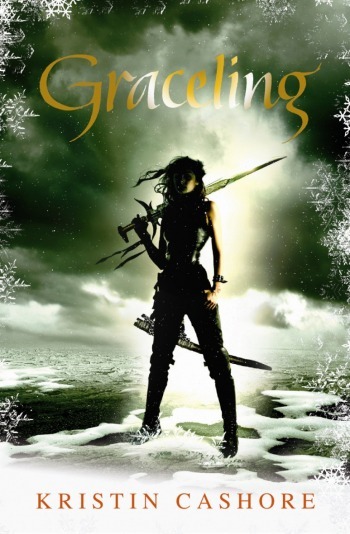 Graceling by Kristin Cashore is a book I’ve heard many good things about, and a book I’d been meaning to read for a while. It’s a fantasy book about an arse-kicking heroine and it elicited a variety of different feelings in me.
Graceling by Kristin Cashore is a book I’ve heard many good things about, and a book I’d been meaning to read for a while. It’s a fantasy book about an arse-kicking heroine and it elicited a variety of different feelings in me.
Katsa is Graced with supernatural fighting ability. In her world, when people have two different coloured eyes they will have some sort of magical Grace which can differ wildly between people (ability to hold breath for a very long time, ability to predict the weather, supernaturally good dancer, fighter, musician, etc). Katsa is also the niece of King Randa. In his kingdom, all Gracelings must be sent to serve the king as soon as their Grace becomes apparent. He sends the more “useless” people (eg good swimmers) back to their families and keeps the more useful ones. Katsa, with her fighting/killing Grace, becomes a useful tool he shapes into his weapon as she grows up. And so she serves as his thug, breaking kneecaps bones or killing when people owe him money or slight him. Until one day someone points out that she’s more powerful than the king and the king can’t actually force her to do anything.
Which was sort of odd, I thought. That she never realised it herself, I mean. She has no family or friends that aren’t also valued to the king (the king’s only son, for example, and his spymaster). On the side, they and a few others had even been running a secret Council — a network of well-meaning people running around, helping the less fortunate. In fact, the book opens with Katsa rescuing an imprisoned old man, about whom they know little, simply because he was imprisoned apparently unjustly. This is one of the ways in which Katsa is a bit of a contradiction of a character: she runs around defying the king in secret without realising that defying him openly wouldn’t be much harder. She thinks she’s a terrible person because of how easily she can kill, but she spends a lot of time helping people she has absolutely no obligation to even care about. She thinks the amount of power a person has dictates how horrible a person they are, yet she’s pretty powerful and not a horrible person. The girl full of contradictions was interesting to read about.
For the first half or so of the book, my thoughts were that it wasn’t bad but that it had perhaps been over-hyped a bit. Aside from a few amusing (laugh out loud) exchanges, it felt a bit directionless. It seemed as though Katsa was going along with things that happened to be convenient. In the end, everything from the first half of the story tied in with the main action but it was hard to see that until later. Half way through, the story picked up significantly, adding genuine danger to Katsa (since normally no one can hurt her) and giving her a concrete mission for the rest of the novel. After that I enjoyed it much more and the second half was significantly more un-put-down-able than the first.
I had a few pet peeves crop up as I was reading, another aspect which mixes up my feelings for Graceling. It bothered me when Bitterblue, a ten year old princess, was constantly referred to as the child instead of by her name. It’s true she didn’t have a lot of agency for most of her time in the story, but it felt a bit dehumanising, like she was just a person Katsa had to protect, not so much a person in her own right (she wasn’t treated that way all the time in the narrative, but enough to bother me). There was also, near the start, the moment where Katsa gleefully fed a dirty and damaged dress into the fire. It was very much in character for her to hate anything which hampers her movement, but in a pre-industrial realm such a dress would have taken days to make, with the fabric imported from far away, etc. While her not caring about her uncle’s money makes sense, destroying the dress so insensitively (especially since her maid is so invested in the dresses) bothered me.
Cashore’s series (Graceling, Fire, Bitterblue) has a different central character in each book. As such, Graceling ties up all the loose ends in Katsa’s life without entirely giving us a “happily ever after”. I expect to see her pop up in the later two books and I look forward to seeing how she goes. (And while I hope she never changes her stance on marriage, I hope she and her love interest are happy together.)
Graceling is not a long read, for a fantasy book, and I recommend it to fans of fantasy and kick-arse heroines.
4.5 / 5 stars

No comments:
Post a Comment
Note: only a member of this blog may post a comment.